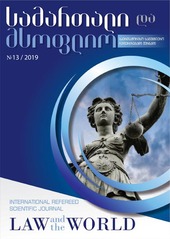COMPENSATION FOR IMMATERIAL DAMAGE DUE TO INJURY TO HEALTH 
##plugins.themes.bootstrap3.article.main##
Abstract
Compensating the immaterial damage is a very problematic issue, since this type of damage is invisible and might be difficult to prove. It is also interesting to look at the terminology of the case, as the fact that the both – moral and non-pecuniary damage are used in jurisprudence, causes disagreement. The aim of the given work is to establish sense of immaterial damages, basis of civil justice responsibility for immaterial damages and compensation for such damages due to bodily injury and damage to health. Problematic issues of a non-pecuniary damage will be examined by using normative-dogmatic and comparative legal methods, as well as, by analysis of visions of the leading scholars and that of case law. It is recognized that the law protects absolute human rights, which are closely linked to personal non-property rights, resulting in immaterial damage. The analysis of Georgian civil law has illustrated that the principle of strict determination of damages is in force, in particular, according to paragraph 1 of the Article 413 of the Civil Code, non-pecuniary damage may be claimed only in the cases specified in law in the form of reasonable and just compensation. However, compensation for non-pecuniary damage must be taken into account, as restitution is excluded in this case and monetary compensation serves as the alleviation of suffering of a victim. The recommendation to extend the responsibility to delinquency is also presented with this regard.


